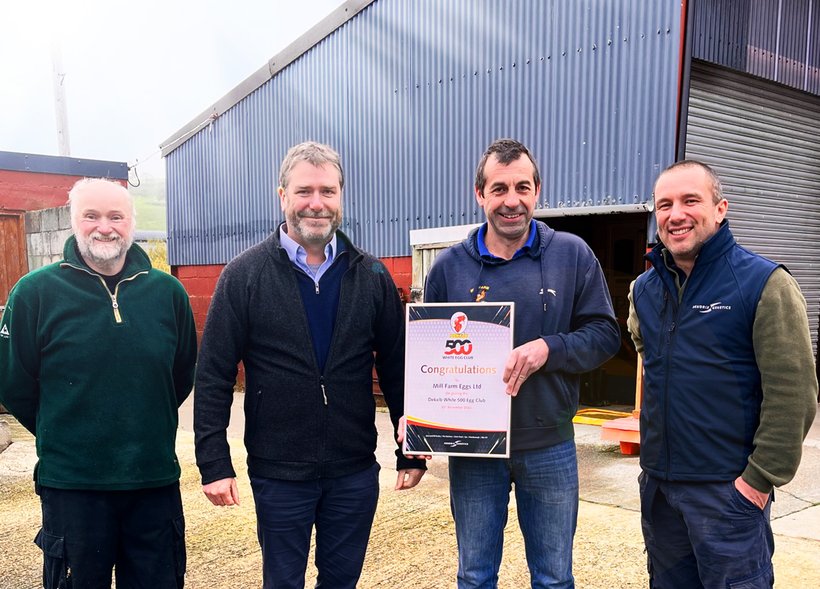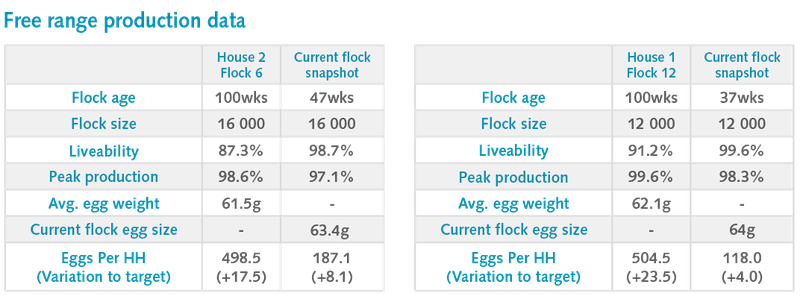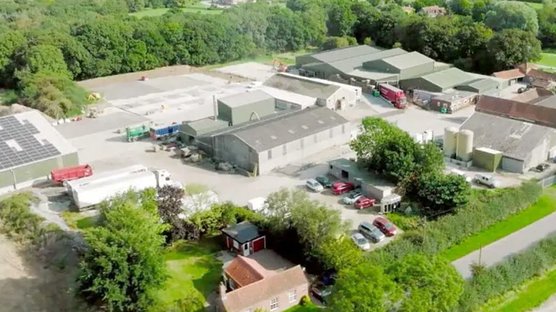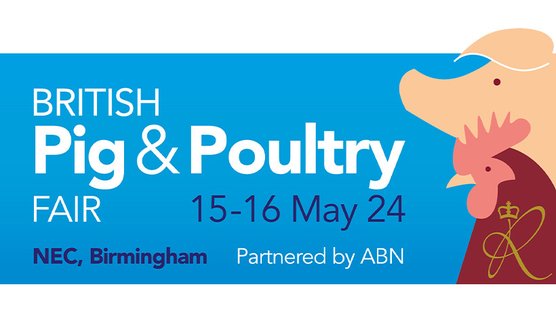
Published on Feb. 24, 2023
Mill Farm Eggs join the Dekalb White 500 Egg Club
With a long history in layers, dating back to 2007, Mill Farm Eggs have an impressive body of experience to call on, and Nigel Roberts can reflect on his varied career and changes in the sector going back nearly two decades.
Located at Pen-Y-Bont, near Oswestry in Shropshire, farming goes back over several generations of the Roberts family. Nigel and Clare are the second generation to farm at Mill Farm following in Nigel’s father’s footsteps, who in turn grew up on his parent’s farm, before leaving to buy Mill Farm, from a local family. Now producing eggs for Stonegate, alongside running his own contract pullet rearing business, Nigel is one of the growing numbers of white bird enthusiasts, and a member of the Dekalb White 500 Club.
Making the switch from cattle farming to poultry
Before diversifying into poultry, the 100 acres were used for sheep and cattle farming, with Nigel broadening his agricultural and husbandry experience by contracting for local farmers, and then taking a job with Grampian Foods of Littleness. Working for 4½ years as a foreman managing 120,000 broilers, Nigel had plenty of poultry experience to draw on when, in 2006, the family recognised there was a growing market for free-range eggs and began to diversify into layers. By his own admission, Nigel didn’t enjoy farming sheep so when his cousin, Dave Roberts, showed him his flocks of layers, housed in polytunnels, he began to think seriously about branching out in that direction.
The first flock of 4,500 birds were Hy-Line, housed in a flat deck system based in a converted cattle shed. As Nigel recalls, “multi-tier wasn’t really a thing in 2007. Following my cousin’s example, we opted for SKA Equipment supplied by Elm, a local poultry equipment company” Based in Italy, SKA has been operating in the poultry equipment sector, supplying equipment for free-range production since 1954.
The conversion went smoothly, with support from Gale Cooper of Elm, and a great fitting team. At the same time Mill Farm began to form the enduring partnership with Lloyds/CFP, which continues to this day.
A strong demand for free-range eggs and a huge expansion
A further flock of brown birds followed, and then, with the market looking healthy, and free-range demand strong, Mill Farm embarked on an expansion programme which would bring capacity to 12,000 birds. An extension was built to the existing shed whilst the flock housed next door were in lay! Once depleted, the extension was knocked through and the next flocks housed in the enlarged system.
In 2O12 a completely new house was commissioned. The second building had capacity for 16,000 birds, bringing the total capacity to 28,000 birds. Once again Nigel opted for the flat deck system. As Nigel puts it “Its best to stick to what you know!” It was at this point that Simon Cooper, an integral part of the team joined to help manage the larger unit.
In the beginning
In the early days Mill Farm sold their eggs to a local packer, Russel Jones and then to Staveley’s, in Lancashire, with guidance from Tom Davis at Lloyds. “When Staveley’s decided to rationalise their producers, we were still mid cycle with flocks of Lohmann lights, but Tom discussed the option of moving to Stonegate, and we took his advice. We always feel Lloyds and Country Fresh Pullets have our best interests at heart” says Nigel.
Following the move to Stonegate, Mill Farm managed flocks of British Black Tails and Burford Browns, destined for Clarence Court and Waitrose. “The Burfords were brilliant” Nigel recalls.
In 2020 Nigel ordered his first flock of Dekalb White birds, convinced that the high egg numbers, longer cycles and excellent feed conversion made both a strong welfare case and a convincing financial argument for white eggs.
The Dekalb White birds do exactly what it says on the tin. We save money by having fewer turnarounds and the current flock have been brilliant, currently laying at 98% at 34 weeks. We are very happy with our white birds, there are others around, but we intend to stick with Dekalb White birds.
“The birds would be fully beaked, and the family had some reservations” Nigel recalls “Tom reassured us all that the Dekalb White combined extended production cycles, superb persistency, an excellent feed conversion ratio with docile behaviour and excellent liveability.
“The Dekalb White birds do exactly what it says on the tin. We save money by having fewer turnarounds and the current flock have been brilliant, currently laying at 98% at 34 weeks. We are very happy with our white birds, there are others around, but we intend to stick with Dekalb White birds. Both Simon Bowden of Joice and Hill and Dylan Jones of Lloyds / Country Fresh offer good advice and are just a phone call away.
“Enrichment is vital to the welfare of the birds and so we add extensive perching in the flat deck houses. We also pay extra attention to diet and supplements, recognising the needs of birds that are now laying for 100 weeks. I am happy to admit we are focused on having a high attention to detail and it seems to pay off, with the birds performing so well”. Nigel adds




